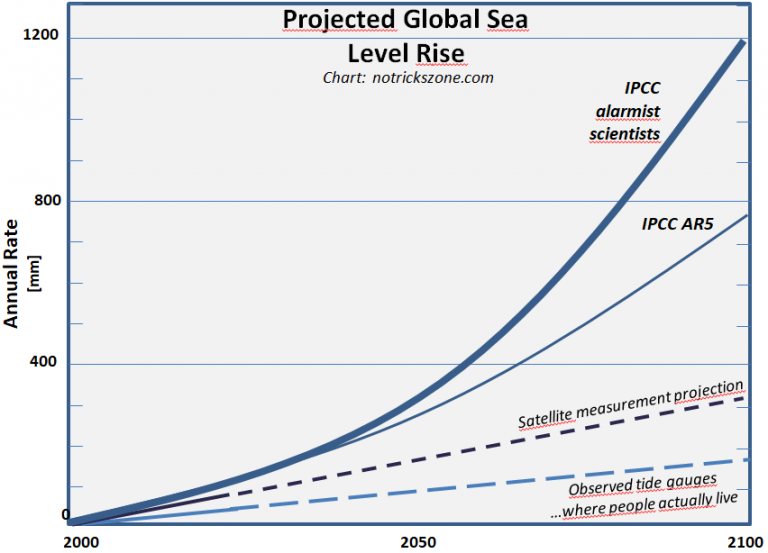By P Gosselin on 19. July 2018
Especially IPCC alarmist scientists like spreading scare stories about sea level rise, and how it’s accelerating.
So far global CO2 emissions have in fact continued to climb at a rate that is defined as the “business as usual” emissions scenario RCP8.5, which means a sea level rise of up to 97 cm by 2100, according to the most recent IPCC projections:

IPCC AR5 sea level rise for 4 different emissions scenarios. So far CO2 emissions have been on the worst case path.
Could even be 90 by 2060!
And some experts even suggest that sea level rise may occur even far more quickly. For example the Pacific Islands Ocean Observing System (PACIOOS) here wrote. “Recent observations and projections suggest that 3 feet (90 cm) or more of sea level rise could occur earlier than 2100 and even as early as year 2060.”
Meanwhile some time ago alarmist climate site Skeptical Science here wrote: “Overall, the range of projected sea level rise by 2100 is 75 to 190 cm.”
Of course, hysterical sites like Skeptical Science don’t publish anything without first injecting a good dose of hyperbole. So we will put them down for 1200 mm of sea level rise by 2100.
Gap between reality and IPCC about to become glaring
The following chart depicts the IPCC alarmists, like Skeptical Science, projection (1200 mm), the conservative IPCC AR5 business as usual estimate (800 mm), the projected linear trend of the satellite measurements trend (320 mm), and the projected trend of what the tide gauges – i.e. where people actually live – have been observing (160 mm):
Observed data show no signs that sea levels are rising as quickly as IPCC models have been suggesting. IPCC alarmist scenarios are about 7 times higher than what is observed by tide gauges. Chart: notrickszone.com.
Acceleration not showing up in the observations
Naturally the alarmists always claim that the sea level rise rate will be modest at first, but that it will really begin to take off in a decade or two once the oceans warm and expand, and Greenland and Antarctica start to melt in earnest.
But there’s only one problem: So far there hasn’t been any noteworthy acceleration seen in neither the satellite data or tide gauge data.
Moreover, Greenland and Arctic ice volume have been increasing. And so has Antarctica. Of course we do see a paper from time to time with alarmist scientists statistically waterboarding some rate increase out of the sea level data, but almost always the increase gets traced back to natural variation.
Time is running out – for the alarmists
What’s clear is that we will certainly know what sea level rise is doing in 15 years, ca. 2033. by then the IPCC claimed acceleration should making its debut in earnest.
However, if the tide gauges don’t show some real, major acceleration by then, from 1.6 mm/year to say 4 mm/year, then it will be safe to say that any IPCC of over 70 cm was nothing but wolf-crying.
We’re watching carefully. The days of the sea level scare story are numbered.


